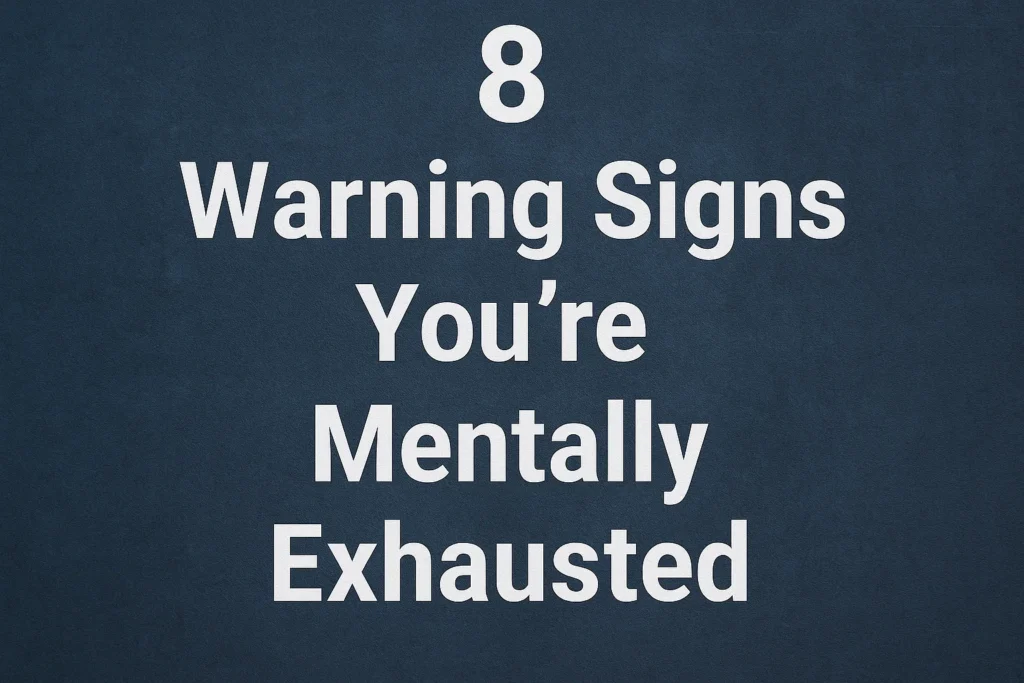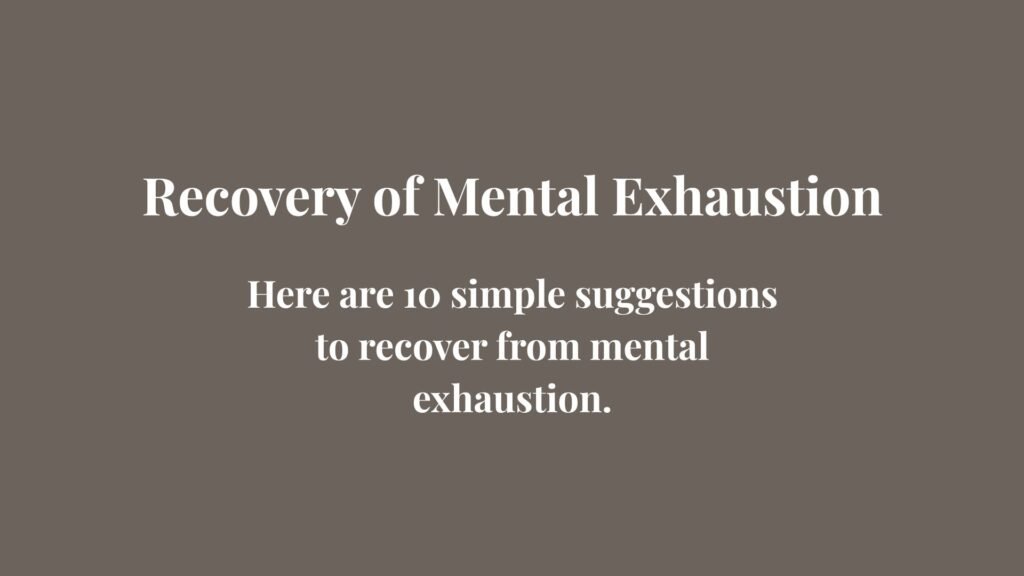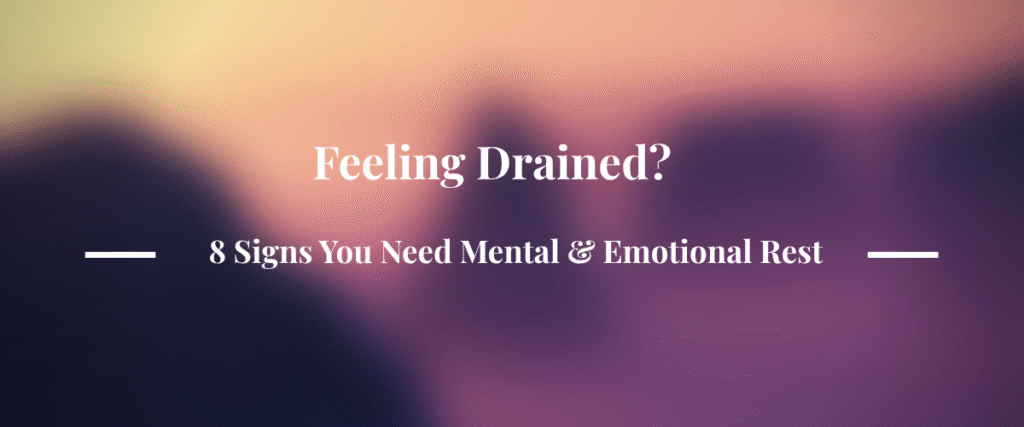You can usually tell when your body is physically tired—but what about your mind?
Mental exhaustion symptoms aren’t always as easy to recognize. Unlike physical fatigue, feeling mentally exhausted can show up subtly—through irritability, brain fog, or emotional detachment—and unfortunately, it’s not something a single night of sleep can always fix.
Here’s an interesting example: Albert Einstein reportedly owned several identical outfits so he wouldn’t waste mental energy choosing what to wear each day. He even avoided memorizing his own phone number to conserve brain power. These small choices reflect the importance of protecting our mental and emotional health—something many of us overlook.
If you’ve been feeling drained or out of focus, it might be time to take a closer look at your mental wellbeing. Recognizing exhaustion symptoms early and making space for mental wellness practices can help you improve mental health before burnout takes hold. Incorporating simple self improvement tips into your routine—like setting boundaries, reducing decision fatigue, or practicing mindfulness—can support both your emotional health and long-term vitality.

8 Warning Signs You’re Mentally Exhausted
You’re losing your patience
If you’ve noticed your patience slipping more often—snapping at family members or being short with coworkers—it could be more than just a bad day. While occasional irritability is normal, constantly feeling on edge is one of the common mental exhaustion symptoms. When you’re mentally exhausted, your ability to regulate emotions and respond calmly is diminished. This emotional strain is a clear exhaustion symptom and a signal that your mental wellbeing may need attention and support.

You’re easily irritated
If small things that normally wouldn’t bother you are suddenly getting under your skin, it could be a red flag. Just like a lack of sleep can leave you feeling cranky, mental exhaustion can trigger heightened irritability as well. When you’re mentally drained, your tolerance drops—and even minor frustrations can feel overwhelming.

You’re having anxiety or panic attacks
This is a clear warning that your mental health needs immediate care. If you’re experiencing a tight chest, struggling to take a deep breath, or finding it impossible to relax, your mind is signaling that it’s time to pause and prioritize mental rest and recovery.
You’re unmotivated
Have you lost interest in the things you usually enjoy? Feeling unmotivated is often a sign that you’re mentally overwhelmed and emotionally drained. Don’t lose sight of your goals—it simply means it’s time to rest, reset, and restore your energy so you can find your focus again.
You’re suffering from insomnia
If you’re lying awake for hours or waking up multiple times during the night, it might be more than just physical exhaustion—you could be experiencing mental exhaustion as well. This type of fatigue runs deeper and isn’t easily fixed by a single good night’s sleep. Instead, it calls for intentional recovery and a focus on restoring your overall mental and emotional wellbeing.

You’re suffering from indigestion and tummy trouble
Your gut health can offer important insights into your mental wellbeing. An imbalance in gut flora may interfere with the production of key hormones responsible for mood regulation, potentially leading to a decrease in those feel-good chemicals your body needs to stay emotionally balanced.
You cry out of the blue
Do you find yourself suddenly bursting into tears for no clear reason?

You feel detached
If you feel disconnected or like reality is slipping away, it could be a sign that you’re mentally and emotionally exhausted.
Recovery of Mental Exhaustion
Here are 10 simple suggestions to recover from mental exhaustion

Looking to improve mental health and feel more balanced throughout your day? Taking care of your mental and emotional health doesn’t have to be complicated—it often starts with small, intentional changes. Here are 10 powerful yet practical self improvement tips that can boost your mental wellness and strengthen your overall emotional health:
1. Prioritize Quality Sleep
Ever notice how life feels more manageable after a restful night? Sleep is one of the most effective ways to recharge your mind and body. Sticking to a consistent bedtime and wake-up schedule can significantly enhance your mental wellness and energy levels. Everyone has an ideal amount of sleep—make it a priority to find and protect yours.
2. Establish Daily Routines
Creating simple, consistent routines can help reduce decision fatigue and daily stress. Whether it’s a morning ritual or setting time aside each weekend to handle bills, routines help conserve mental energy so you can focus on what really matters for your mental and emotional health.
3. Practice Mono-Tasking
Multitasking might feel productive, but studies show it actually drains more mental energy. Instead, focus on one task at a time. Completing tasks sequentially improves focus, reduces stress, and supports better mental health.
4. Take Regular Breaks
Short, frequent breaks can do wonders for your brain. A quick 15-minute pause every 90 to 120 minutes helps reset your focus and boosts both physical and emotional health. Listen to your body—it knows when you need a mental reset.
5. Get some exercise
Exercise is a natural mood enhancer. Physical movement clears your mind, reduces stress, and contributes to emotional balance. Even a light walk can have a powerful impact on your mental wellness and overall well-being.
6. Eat wisely
The food you eat plays a vital role in how you feel mentally. Avoid processed or hard-to-digest meals that drain your energy. Instead, choose foods that support stable blood sugar and increase vitality. Eating mindfully can uplift your mental and emotional health from the inside out.
7. Let Go of the Small Stuff
Not everything in life deserves your attention. Conserve your energy for what truly matters. Releasing unnecessary stressors allows you to redirect your focus to things that positively impact your mental wellness.
8. Make a schedule before going to bed
Setting a schedule the night before helps you wake up with direction and clarity. Knowing your plan in advance reduces morning stress and sets a positive tone for the day—an easy habit to improve both productivity and emotional health.
9. Learn to Delegate
You don’t need to do everything yourself. Delegating tasks—whether at home or work—frees up your time and mental bandwidth. This simple step can significantly reduce overwhelm and improve your mental wellbeing.
10. Keep Your Self-Talk Positive
The way you speak to yourself matters. Negative thoughts can quietly deplete your mental energy. Shift your inner dialogue to something encouraging and kind. A positive mindset fuels motivation, resilience, and lasting improvements in mental and emotional health.
Taking steps to nurture your mind doesn’t require a complete life overhaul. Start by choosing a few of these self improvement tips and work them into your daily routine. Even small changes can lead to big improvements in how you feel, think, and live.
